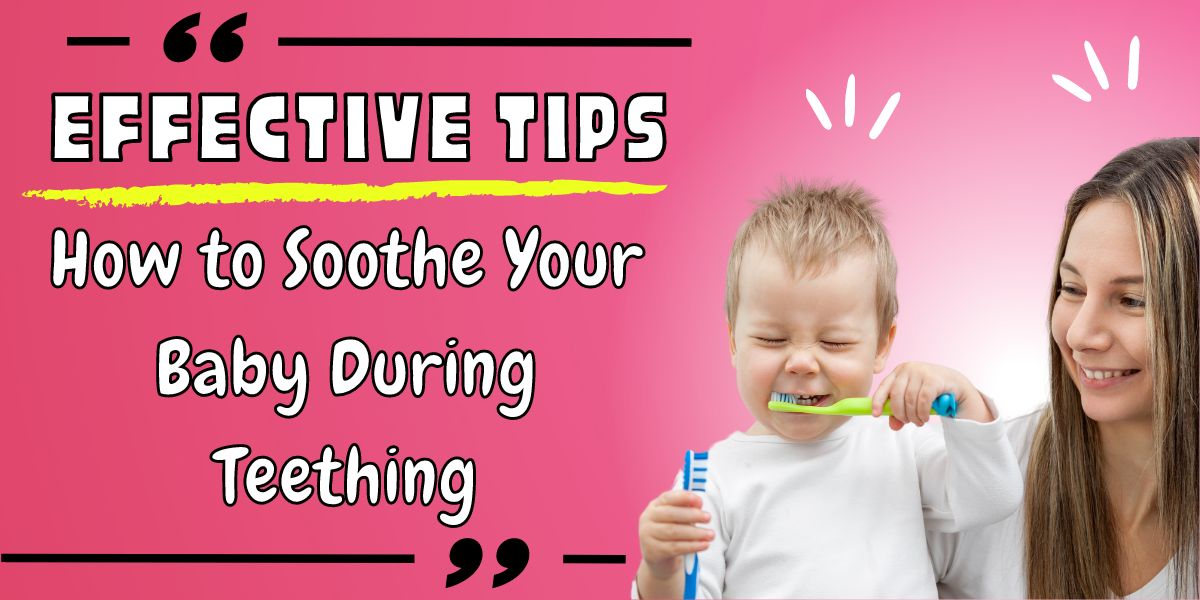Teething can be a challenging time for both babies and parents. As your little one’s first teeth start to emerge, they may experience discomfort and irritability. However, there are several ways to help soothe your baby during this process. In this blog post, we’ll explore some effective methods to ease your baby’s teething woes and help both of you get through this phase with minimal stress.
Understanding the Teething Process

Before diving into the soothing techniques, it’s essential to understand the teething process. Typically, teething begins around 6 months of age, although it can vary from one baby to another. During this time, the baby’s first set of teeth, known as primary teeth, start pushing through the gums, which can cause soreness and discomfort. Some common signs of teething include:
- Excessive drooling: Babies may produce more saliva than usual, leading to drooling.
- Irritability: The discomfort caused by teething can make babies more irritable and fussy.
- Swollen or sensitive gums: The gums may appear swollen or red, and they can be sensitive to touch.
- Loss of appetite: Babies may experience a decrease in appetite due to the discomfort.
- Difficulty sleeping: The pain and discomfort can make it challenging for babies to fall asleep or stay asleep.
Effective Ways to Soothe Your Teething Baby
1. Gentle Gum Massage
One of the simplest and most effective ways to soothe your teething baby is by gently massaging their gums with a clean finger. The gentle pressure can help alleviate some of the discomfort and provide temporary relief. By using your finger, you can apply just the right amount of pressure to ease your baby’s discomfort without causing any harm.
2. Chilled Teething Toys or Washcloths

Chewing on something cold can help numb the gums and reduce the pain and inflammation caused by teething. Consider giving your baby a chilled teething toy or a clean, damp washcloth that has been refrigerated for a soothing effect. The cold temperature can provide a numbing sensation and offer relief to your baby’s sore gums.
3. Teething Rings

Teething rings, especially those made of silicone, are designed to provide a safe and satisfying chewing experience for teething babies. The pressure from biting down on the ring can help relieve the discomfort and also aid in the eruption of the teeth. The soft and flexible texture of silicone teething rings makes them gentle on your baby’s gums while providing the necessary counterpressure.
4. Teething Gels
There are over-the-counter teething gels available that can be applied to your baby’s gums to provide temporary relief. However, it’s crucial to consult with a pediatrician before using any medication or gel to ensure its safety and proper application. These gels often contain ingredients like benzocaine or lidocaine, which can help numb the gums and alleviate the pain associated with teething.
5. Comforting Foods

If your baby has started on solid foods, offering cold and soothing options like yogurt, purees, or chilled fruits can help ease the discomfort and provide a welcome distraction. These foods not only provide a cooling effect but also offer nutritional benefits. The smooth texture of yogurt or purees can be soothing to your baby’s gums, while the coldness can help reduce inflammation.
6. Cuddles and Comfort
During this challenging time, your baby may seek more comfort and reassurance. Offering extra cuddles, hugs, and soothing words can go a long way in providing emotional support to your teething baby. The warmth and security of your embrace can help your baby feel safe and loved, which can help alleviate their discomfort and make them feel more at ease.
Conclusion
Teething can be a trying period for both babies and parents, but with patience and the right soothing techniques, you can help alleviate your baby’s discomfort and make this phase more manageable. It’s important to remember that teething is a natural process and, like all phases of infancy, it will pass. By understanding your baby’s needs and providing the right kind of comfort and care, you can help them sail through the teething process with minimal fuss.
Remember, every baby is different, so it’s essential to be patient and attentive to your baby’s individual needs during this time. If you have any concerns about your baby’s teething or are unsure about the best methods to soothe them, don’t hesitate to consult with a pediatrician for personalized guidance. They can provide you with tailored advice based on your baby’s unique situation and help you navigate this challenging phase with confidence and ease.
You might also be interested in:
Should Newborns Sleep with Pacifiers? Pros and Cons Explained

